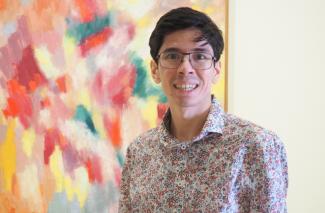The Quest for Dialogue: A PhD Experience

Alexander Mack talks about how singing practice helped him prepare for his final PhD oral examination, and how stammering has made him more aware of sounds, language and communication.
Finding your voice with a stammer shares similarities with finding your voice to complete a PhD. I was awarded my PhD after a thrilling viva voce (a type of oral exam) to reach the summit of learning across three universities in Australia and the UK. Personally, I struggle with improvised small talk but enjoy longer, more intricate conversations. My stammer has sensitised me to the interconnections between language and emotions, which became the focus of my dissertation entitled 'Fortified Societies: The Mobilisation of Shared Anxieties'.
School
My early childhood was spent in Port Moresby, Papua New Guinea and later I moved back to Australia. My high school teachers related to me as a person and they saw beyond the stammer, which gave me confidence. Developing and maintaining the reciprocal assurance of others — whether it be friends, family, teachers or colleagues — is crucial for anyone with a stammer. By the time I reached my final year I was made a Prefect, which brought leadership responsibilities and interactions with people from different ages. Although my classmates were understanding, I sensed their jealousy in English class, when I was given more time in oral presentations.
My stammer has sensitised me to the interconnections between language and emotions.
There was one decision I made in high school that helped me in later years, though I didn’t know it at the time. I did singing lessons from ages 12 to 17 as well as formal vocal exams, choir, and I performed in three musicals, because you do not stammer when you sing. Performing music helped me regulate and channel any apprehensions into a satisfying dialogue with an audience. Presentations could be enjoyable. Through singing I learnt various breathing exercises, which in turn helped my spoken presentations.
University
My undergraduate studies at the University of Queensland were more challenging. One distressing memory from my 1st year, which I buried for a while, was when I walked through the Great Court, a large semicircular grassed area of the University, when another student yelled out "stammer boy". I later deduced that the student in question must have been a fellow classmate in the Introduction to International Relations course I was doing at the time. There I stammered a question during a lecture in front of 200 other students. Also, my dissertation supervisor displayed a lack empathy and impatience. I never felt comfortable speaking to him.
The exam itself was an exhilarating dialogue. I felt in control for each moment during those one-and-a-half hours.
At the end of my Masters, at Australian National University in Canberra, I applied and was awarded a scholarship to begin a PhD that year at Aberystwyth University in Wales. After a tumultuous first year I finally settled on a topic with a supervisor who, like my high school teachers, helped nurture my more spontaneous energy into more structured and precise written and verbal expressions. We engaged in an intellectual dialogue where I was alert but never so tense that I stammered. I embraced opportunities to ask questions at research seminars. A visiting American Professor described the PhD as akin to a symphony, so I combined the rehearsal and breathing techniques of singing into communicating my research at conferences, seminars and then the viva voce exam.
The exam
For PhDs in the UK, the viva voce exam is the final culmination of years of research into an oral dialogue with an external and internal examiner about your dissertation. It’s where you give a verbal defence of your thesis to demonstrate your ability to participate in academic discussion. Like any other performance, I rehearsed for it. In one rehearsal, I deliberately underprepared. I wanted to test how much of my project I could recall in those split seconds and afterwards knew which areas to practise in the final month, to be ready for the moment of performance.
The exam itself was an exhilarating dialogue. I felt in control for each moment during those one-and-half-hours. In his report, my external examiner praised an eloquent performance and my ability to think on my feet. Considering I sometimes struggle to order coffee at a café, my viva voce performance was remarkable.
Advice
My advice for anyone with a stammer starting and/or doing a PhD is to think about the multiple aspects that make up the person that is you. Your PhD speaks to your experiences and having a stammer makes you more aware of certain forms of relations whether it is through sound, language and/or communications. Seek out people who will not judge you on the hesitancy of your voice, but on the precision and erudition of your ideas. There you will find your voice and feel a degree of assurance that will help you speak to any audience.
For more information, see our page Help With Stammering At University & College.
Join the Stammerers Through University Consultancy (STUC). STUC is the world's only initiative which solely aims to support students and staff in higher education who stammer.

































